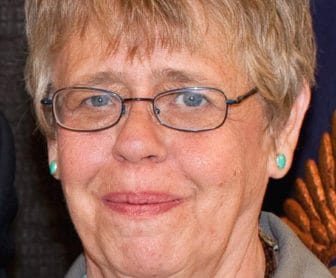“The civil rights of none shall be abridged on account of religious belief or worship, nor shall any national religion be established, nor shall the full and equal rights of conscience by in any manner, or on any pretext infringed.
“The people shall not be deprived or abridged of their right to speak, to write, or to publish their sentiments; and the freedom of the press, as one of the great bulwarks of liberty, shall be inviolable.”
– James Madison’s proposed addendum to the U.S. Constitution, presented to the First Congress, June 8, 1789
COMMENTARY: If that statement seems familiar, it is because you may have read the final version of it, the First Amendment to the U.S. Constitution. Once again that freedom, so carefully laid out, is being challenged.

Courtesy photo
Claudia Anderson
On Friday morning Forbes published the latest plan of the Department of Homeland Security, a data base of journalists and “media influencers.” They have requested bids for a vendor to build this database, with bids due Friday. So far seven companies have expressed interest.
Just what “media influencers” means is open to interpretation, Does 5,000 followers on Facebook make you an influencer? Will they perhaps check your Klout score?
Does writing commentaries for a web-based local news site qualify? The plan does not make that clear.
Nor is this simply a contacts list. The bid also includes something of the scope of the information gathered. Besides the usual contact information, according to Bloomberg, among several other things, the publications’ geographical reach and the “sentiment” of the writer will be tracked.
Again, we are given a word vague enough to cover a multitude of issues. Here, one could make an educated guess that the writer’s political leanings will be tracked.
Why does this matter? Because as noted in the beginning of this commentary the press is the great bulwark of liberty, its freedom inviolable. Tracking by the government of those whose job it is to report on the government is the very antithesis of that freedom.
Nixon’s famous lists contained at most about 150 names. This database proposes thousands. The wording of the proposal is broad enough to cover just about anyone who puts fingers to keyboards to speak on any subject, if it touches on the broad mission of Homeland Security, and by extension the current administration.
Most administrations have an adversarial relationship with the press. This administration goes far beyond that, regularly sending out Tweets and making statements that in and of themselves could be considered First Amendment violations. What would they do with such a registry? Could it be used to reward the faithful and punish those who disagree with them? Would many journalists feel free to report adverse news?
What of those everyday people, from pastors to students, who have, for one reason or another, developed a large following on social media? They are now major media influencers. What is the chilling effect on them if they are included in this list? Are any of us free to speak out, knowing that we might end up on a government list?
Pieces like this usually end with a call to action. Call your congressman or write a letter to the editor.
Given the way this has so far slipped under most people’s radar, maybe the best action is to simply share this commentary. Maybe if we use media we can create enough pressure on DHS to rethink this overly ambitious project, and they can just go back to their Rolodex and press releases, and not threaten our most inviolate freedom.
Claudia Anderson of Farmington is a past Democratic Party county officer and
member of the party’s State Central Committee. She has been active in several
political campaigns. Today she follows politics avidly as a concerned citizen.
She has been proudly voting since 1972. Agree with her opinion? Disagree? We welcome your views. Learn about submitting your own commentary here.